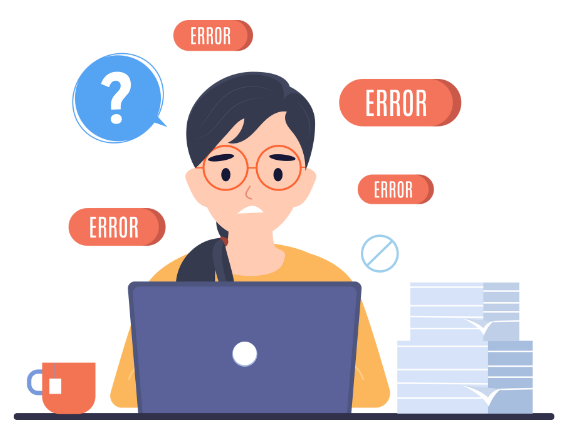Estimated reading time: 12 minutes
For many candidates worldwide, the Pearson Test of English (PTE) bridges global opportunities – higher education, immigration, or professional avenues. However, the path to unlocking these doors is laden with common pitfalls that need careful navigation.
Introduction: PTE Test: What Is It?
Avoiding common mistakes is essential to achieving a high PTE exam score.
By avoiding these common mistakes, you can increase your chances of achieving a high score on the PTE exam. A good score is your gateway to top courses to study in Australia.
Common mistakes that PTE test-takers make include:
- Not understanding the task instructions
- Not managing their time effectively
- Using informal language
- Making grammatical errors
- Speaking too quickly or too slowly
- Not following the word count requirements
- Not proofreading their work
Overview of the main sections of the PTE exam:
The PTE exam consists of four sections:
- Reading: This section assesses your ability to read and understand various academic texts.
- Writing: This section sets your ability to write clear, concise, and grammatically correct English.
- Speaking: This section sets your ability to speak English fluently and accurately.
- Listening: This section sets your ability to understand spoken English.
Each section is scored on a scale of 0 to 90, with 90 being the highest score possible. Your overall PTE score is calculated by averaging your scores on the four sections.

Speaking and Writing Mistakes : Common Mistakes and Tips to Avoid Them
Imagine stepping up to the mic, confident about the topic, only to falter in pronunciation or fluency. These blunders in the speaking section can hurt your overall score.
Many candidates have a wealth of ideas regarding writing but fall prey to grammar inconsistencies, typos, and spelling errors. It is like having a goldmine but not the tools to extract it.
Common speaking mistakes for PTE:
- Pronunciation errors: Some common pronunciation errors that PTE test-takers make include:
- Not pronouncing all of the sounds in a word correctly
- Not stressing the correct syllables in a word
- Using the wrong intonation pattern
- Fluency issues: Some common fluency issues that PTE test-takers have include:
- Speaking too quickly or too slowly
- Hesitating too much
- Using filler words such as “um” and “like.”
Common writing mistakes for PTE:
- Grammar errors: Some common grammar errors that PTE test-takers make include:
- Subject-verb agreement errors
- Verb tense errors
- Preposition errors
- Spelling errors: Some common spelling errors that PTE test-takers make include:
- Misspelling words
- Not using punctuation correctly
Tips and strategies to improve speaking and writing skills for PTE:
- Pronunciation:
- Record yourself speaking and listen to identify any pronunciation errors.
- Practice saying words and sentences that are difficult for you to pronounce.
- Get feedback from a native English speaker on your pronunciation.
- Fluency:
- Practice speaking English regularly.
- Try to speak English in different contexts and for various topics.
- Record yourself speaking to identify areas where you need to improve your fluency.
- Grammar:
- Review English grammar rules and practice using worksheets.
- Use a grammar checker to identify and correct grammatical errors in your writing.
- Spelling:
- Practising writing the difficult spellings.
- Use a spell checker to identify and correct spelling errors in your writing.

Listening Mistakes : Common Mistake and Listening Practise Exercises
You might be excellent at comprehending one-on-one conversations but find it challenging when exposed to a range of accents or complex vocabulary in the PTE listening section.
Common listening errors for PTE
- Misunderstanding the context: If you are not familiar with the topic of the audio recording or if you do not understand the speaker’s accent, you may respond incorrectly.
- Missing vital details: If you do not pay enough attention, you may miss out on specific information required to complete the task.
Game-Changing Techniques for Enhancing Listening Comprehension for PTE
- Preview the task instructions: Before listening to the audio recording, go through the instructions to understand what you are supposed to do.
- Listen for the main ideas and supporting details: Focus on listening for the main ideas and supporting details.
- Pay attention to the speaker’s tone of voice and intonation: The speaker’s tone and intonation can provide clues about what is being said.
- Take notes: Notes can help you remember the critical information you hear. You can also use your notes to answer the task questions.
- Practice regularly: Listen to various English audio recordings, such as news broadcasts, lectures, and podcasts.
Practice exercises and resources for improving listening skills for PTE
- PTE website: The PTE website offers a variety of practice exercises and resources for improving your listening skills. You can find these resources under the “Preparation” section of the website.
- PTE practice books: Several PTE practice books are available that offer listening exercises and practice tests.
- Online courses: Platforms such as Edulyte offer customised PTE training classes. You get the benefit of live classes, practice exercises and feedback from qualified instructors from the comfort of your home.

Reading Mistakes: Identify Your Mistakes With Effective Strategies
In PTE, Reading is an exercise in efficiency and comprehension. Spending too much time on a challenging passage or misinterpreting a question can lead to lost marks.
Common reading mistakes for PTE
- Misinterpreting the text: It can happen if you are unfamiliar with the topic or do not understand the author’s writing style.
- Not reading the questions carefully: It can lead to incorrect answers.
- Not being able to identify the text’s main ideas and supporting details: You may have trouble answering the question.
Strategies for efficient reading and effective time management for PTE
- Read quickly and efficiently: Don’t try to read every word carefully. Skim the text to get the main ideas. Go back and read more carefully if you need to.
- Use keywords to identify the text’s main ideas and supporting details: Pay attention to keywords and phrases that are repeated throughout the text. These are likely to be essential ideas.
- Manage your time effectively: Keep an eye on the time and ensure you are not spending too much time on any question. If you find yourself stuck on a question, skip it and return to it later.
Practice materials to enhance reading abilities for PTE
- PTE website: The PTE website offers a variety of practice exercises and resources for improving your reading skills. You can find these resources under the “Preparation” section of the website.
- PTE practice books: Several PTE practice books are available that offer reading exercises and practice tests.
Time Management Strategies: Why Are They Important For You And What Techniques Will Help You
Time Management Strategies
With its multiple sections, the PTE exam can feel like a marathon. Knowing how to pace yourself is crucial. It’s common to see candidates, despite knowing the answers, unable to complete sections due to poor time management.
Time management is essential for success in the PTE exam. The exam is timed, and you will have limited time to complete each section.
Here is a breakdown of the recommended time allocation for each section of the PTE exam:
| Section | Recommended Time |
| Reading | 29-30 minutes |
| Speaking & Writing | 54-76 minutes |
| Listening | 30-34 minutes |
Here are some time-saving tips and techniques for completing the PTE exam within the allocated time frame:
- Read the instructions. It will help you understand what you are asked to do and focus on the relevant information.
- Have a clear structure in mind for your essay or summary. It will help you to write quickly and efficiently.
- For speaking and writing, organise thoughts briefly before starting, ensuring a more structured response and reducing the need for extensive edits or pauses.
- In listening tasks, focus on key phrases or terms often central to the correct answer.

Test-Day Preparation
Proper test-day preparation is essential for success in the PTE exam. It helps you feel more confident and prepared and reduces stress and anxiety.
Here are some of the benefits of proper test-day preparation:
- Improved performance: You are more likely to perform well when well-prepared. You will get a hold of the test format and the types of questions.
- Reduced stress and anxiety: Proper test-day preparation can help to reduce stress and anxiety. Knowing you are prepared will make you feel more confident and in control.
- Increased motivation: Proper test-day preparation can help to improve your motivation. Knowing that you have put in the work to prepare will motivate you to do your best on the exam.
Your Essential Test-Day Checklist:
- Official Identification: A passport or any other ID is typically mentioned by Pearson. Ensure it’s valid and not expired.
- Test Confirmation Email: Keep a printout or a digital copy handy.
- Valid passport: Your passport must be valid for at least six months after the exam date.
- Comfortable Clothing: Remember, exam rooms can sometimes be chilly. Wear something that you’re comfortable sitting in for a few hours.
- A Clear Mind: This might sound cliché, but entering with a cluttered mind can impact performance.
Relaxation and Stress-Reduction Techniques:
- Deep Breathing: Take deep breaths before the exam. It helps in calming nerves and improving concentration.
- Positive Self-talk: Remind yourself of your preparation and the completed practice sessions.
- VisualisationVisualisation: Close your eyes and visualise a smooth test-taking experience.
- Stay Hydrated: Drink water as it aids in keeping you alert and clear-headed.
- Avoid Last-Minute Cramming: Trying to absorb new information right before the test can be overwhelming and counterproductive. Trust your preparation and relax.
Mock Tests and Practice : Recommended Sources
Taking mock tests and practice exams is the real deal regarding PTE prep. Mock tests and practice exams simulate the exam experience. They are a great tool to identify your strengths and weaknesses. They also help you to practise answering questions under timed conditions.
Here are some of the benefits of taking mock tests and practice exams for PTE:
- Familiarity with Test Format: Mock tests and practice exams help you become familiar with the format and structure of the PTE. With more practice, you will get a firm grip on the types of questions, the timing, and the overall test experience.
- Time Management: PTE is a timed test, and time management is crucial. Practising with timed mock tests helps you develop strategies to allocate your time effectively for each section.
- Skill Development: Regular practice helps you improve your language skills, including listening, speaking, reading, and writing.
- Identifying Weaknesses: Mock tests highlight your strengths and weaknesses. AnalysingAnalysing your performance can help you determine which sections or question types you struggle with.
Reputable sources for accessing PTE practice materials
Here are some reputable sources for accessing PTE practice materials:
- Official PTE Academic Practice Tests: Pearson, the organisation behind PTE, offers official practice materials, including the “Official Guide to PTE Academic” and “PTE Practice Tests Plus.” These materials closely resemble the actual test.
- PTE Preparation Books: Numerous PTE preparation books are available from reputable publishers such as Pearson, Cambridge, and Barron’s. These books contain practice tests and tips for test preparation.
- Edulyte’ Resources: When preparing for the Pearson Test of English (PTE), having access to reliable and updated resources can significantly impact your success. Edulyte is a reputable platform offering comprehensive PTE preparation courses, resources and verified tutors. And what is more you get updated Practice tests for PTE. Register for free and check out Edulyte PTE Prep Course!
How to analyse mock test results to identify and address weaknesses?
Once you have taken a mock test, you must analyse your results to identify your strengths and weaknesses. Here are some tips on how to do this:
To analyse mock test results and identify weaknesses:
- Review Your Test: Review your test answers carefully, and note the sections or question types where you made mistakes or took more time.
- Track Patterns: Look for patterns in your mistakes. Identifying patterns can help you prioritise your study efforts.
- Seek Feedback: Seek feedback from a teacher or tutor specialising in PTE. They can provide insights into your performance and suggest strategies for improvement.
- Time Management: Assess how you managed your time during the test. Did you finish all sections or run out of time in some?
- Repeat Mock Tests: Regularly take new mock tests to measure your progress. Keep analysing your results to ensure you are improving your weak areas.
Common Mistakes Case Studies: Real Life Stories of Overcoming Language Mistakes
Case study 1: Alice
Problem: A test-taker named Alice made common mistakes in the reading section. She misinterpreted the text and missed vital details. It affected her score gravely.
Solution: Alice realised that she needed to improve her reading comprehension skills. She started by practising reading different texts, such as articles and reports. She took notes of keywords and phrases.
Result: After practising regularly, Alice’s reading comprehension skills improved significantly. She could identify the main ideas and supporting details of the texts that she read more accurately. As a result, her score in the reading section improved significantly.
Case study 2: Ben
Problem: A test-taker named Ben had a difficult time while writing. He frequently made grammatical and spelling errors. His writing section score was not promising.
Solution: Ben started practising writing different types of essays and summaries. He also started using a grammar checker to identify and correct his errors.
Result: Ben’s grammar and spelling improved significantly after practising regularly. He could write clear and concise essays and summaries with few errors. As a result, his score in the writing section improved considerably.
How did these individuals overcome their mistakes and improved their scores?
All these test-takers overcame their mistakes and improved their scores by practising regularly and using targeted strategies.
Remember that everyone learns at their own pace. Some test-takers may take longer than others to overcome their mistakes and improve their scores. However, all test-takers can improve their PTE scores with consistent practice and effort.
Key Takeaways
- Pronunciation and grammar are foundational; refine them consistently.
- Diversifying listening sources can be the difference between understanding and just hearing.
- Active reading boosts comprehension; practise it daily.
- Always be aware of the clock—every second counts in the PTE.
- Mock tests are more than just tests; they’re your feedback mechanism. Use them diligently.
- The PTE exam becomes less daunting with the right strategies, understanding of common pitfalls, and consistent practice.
Find out all about studying in Australia, admission process, popular courses and a curated list on universities.
Similar Blogs
Learning lessons, study tips, career guides and much more!
The Importance of Time Management in the PTE Exam
Time is an essence, and when you’re sitting for the PTE (Pearson Test of English) exam, every second counts. Effective…
Listening Skills for PTE: How to Excel in the Listening
If you are reading this blog, you have likely heard of the Pearson Test of English (PTE) Academic. It is…
PTE Speaking Section: Strategies for Fluency and Pronunciation
Embarking on your PTE journey? You must be aware of its different sections. Today, let us zero in on the…
Overcoming Test Anxiety: Tips for a Stress-Free PTE Experience
Exams can be daunting, can’t they? Test anxiety is a common psychological phenomenon affecting individuals preparing for it, especially during…
Common PTE Mistakes and How to Avoid Them
For many candidates worldwide, the Pearson Test of English (PTE) bridges global opportunities – higher education, immigration, or professional avenues….
PTE Exam Day Essentials: What to Expect and How to
Embarking on the Pearson Test of English (PTE) journey? Just as important as mastering the English language is understanding the…






